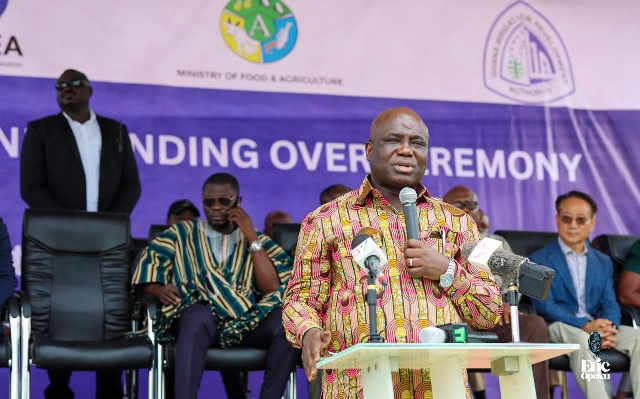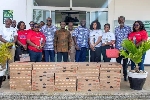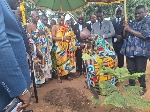Gov't fully restores ties with Korea — Agric Minister lauds renewed cooperation at groundbreaking ceremony
 Mr Eric Opoku speaking at the ground breaking event in Ashaiman
Mr Eric Opoku speaking at the ground breaking event in Ashaiman
The Government of Ghana has successfully restored previously strained relations with the Republic of Korea, paving the way for renewed collaboration in agriculture and irrigation development.
This was revealed by the Minister for Food and Agriculture, Eric Opoku, during the groundbreaking ceremony for the Rehabilitation of Irrigation Schemes at the Ashaiman Irrigation Facility on Thursday.
In his address, Mr. Opoku described the restoration of ties as a strategic move aligned with President John Dramani Mahama’s agenda to transform agriculture into the engine of Ghana’s economic growth.
“Agriculture is the engine for economic transformation in Ghana today,” the Minister said.
“With the right investment and policies, we can improve farmer incomes, create jobs for the youth, and ensure that every Ghanaian benefits from our economic growth.”
He emphasised the importance of irrigation infrastructure in boosting food production and reducing Ghana’s dependence on rainfall.
“This is the story we want to change. We are moving from rain-fed farming to year-round irrigation,” he declared.
Mr Opoku disclosed that upon assuming office, he discovered the Ministry of Food and Agriculture had severed relations with key Korean partners, particularly KOPIA (Korea Programme on International Agriculture).
Taking swift action, he engaged the National Development Planning Commission (NDPC) and personally wrote a letter of apology to KOPIA to mend the diplomatic breach.
“Within a few days, KOPIA responded positively and visited our offices.
Today, that relationship has been fully restored,” he announced to applause.
Since the reconciliation, KOPIA has resumed its support for the rehabilitation of the Ashaiman and Aveyime irrigation facilities and is also spearheading rice seed irrigation projects in Rwanda, which will benefit Ghana.
The Minister also commended KRC (Korea Rural Community Corporation) for their work on the Dawhenya irrigation project, expected to be completed in 2027.
The 100-hectare facility is projected to produce over 10,000 tons of rice seed annually for Ghanaian farmers.
To enhance affordability and sustainability, KIATs, another Korean company, are providing a 1-megawatt solar power system to drive the irrigation infrastructure, reducing production costs and lowering rice prices on the local market.
“As we speak, KOPIA is training Ghanaian farmers to produce quality seeds locally.
For too long, we have relied on imported seeds that often arrive late.
This partnership is helping us become self-sufficient,” Mr. Opoku added.
He concluded by expressing profound appreciation to the government and people of Korea for their ongoing support in areas including irrigation, seed production, and farmer training, describing the renewed cooperation as a vital step toward achieving national food security.
Source: Classfmonline.com/Cecil Mensah
Trending News

GA/R: GAF investigates 'inappropriate conduct' against journalist, civilian by soldiers at Spintex
00:55
Minority accuses government of claiming credit for NPP’s debt relief efforts
13:28
Lands Minister participates in ministerial AI bootcamp to enhance public sector innovation
03:24
Parliament approves hike in marine gas oil levy to curb fuel diversion
12:05
Ato Essien's bail sparks outcry over plight of sick prisoners in Ghana
15:36
'Cedi no apicki, but Abochi get the Dollar’ - Minority teases government’s claims on forex
13:24
Gov't shifts strategy from peacekeeping to peace enforcement in Bawku amid escalating violence
13:10
SIC Insurance PLC donates fifty laptops to KNUST
03:10
BOST rolls out bold solar push in major green energy shift
17:34
Asantehene hands over land for construction of Ghana School of Law campus in Kumasi
15:04




